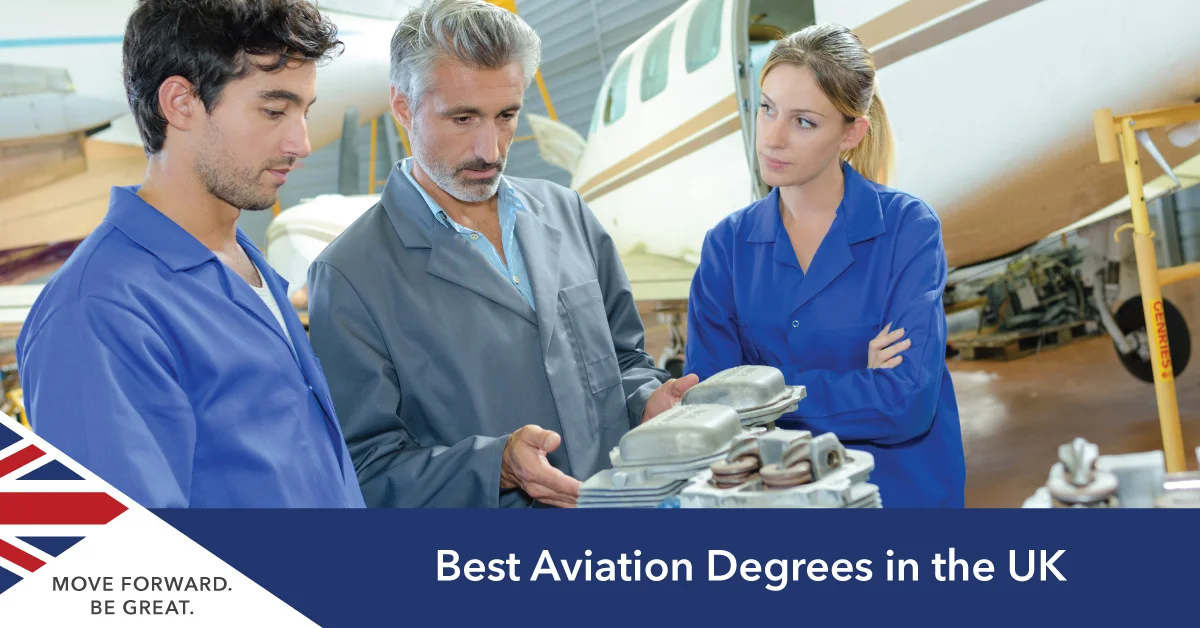Aeronautical Engineering degrees deal with the study, design, development, construction, research, testing and science and technology of operating aircraft, training engineers in the aerodynamic characteristics of aircraft, behaviour and related factors such as airfoil, control surface, lift and drag of commercial or military aircraft, missiles, and spacecraft.
An Aeronautical Engineering course covers several related disciplines, all of which are necessary to create a full engineering team, including:
- Aerodynamics and fluid mechanics
- Aeroelasticity and structural dynamics
- Flight mechanics and control
- Propulsion and combustion
- Structural mechanics and materials behaviour
- System design and optimization
What do aeronautical engineers do?
Aerospace engineers are responsible for the research, design, testing, part assembly and production of aircraft, spacecraft, aerospace equipment, satellites and missiles. They also develop and design extraordinary technologies in commercial aviation, defence systems, and space exploration, such as supersonic jets, helicopters, space shuttles, satellites and rockets.
Some aeronautic engineers specialize in studying the effects of aircraft on the environment and the potential dangers of new aircraft technologies or fuel efficiency. Within aeronautical engineering, a person may focus on the design of aircraft systems, also called avionics, or materials research and selection. Skills developed on an Aeronautical Engineering degree in the UK include:
- High knowledge of Mathematics & Physics
- High proficiency in Research Methodology
- Analytical and Critical Thinking
- Mechanical and Technical Skills
- Interdisciplinary Skills
- Ability to work well with others
Learn more about the best aerospace engineering universities in the UK below (Guardian University Guide 2024) and begin your application to study aerospace engineering by arranging a free consultation with SI-UK India today.

Ten Best Aerospace Engineering Universities in the UK
Below is the list of the top ten universities for aerospace engineering in the UK, according to the Guardian University Guide 2024.
1. Imperial College London
Imperial College London's aeronautical courses will set you on the path to becoming a future leader in aerospace and related engineering disciplines. The MEng Aeronautical Engineering course will provide teaching enriched by an internationally leading research programme.
While studying at one of the best aerospace engineering universities in the UK, you will be able to understand engineering practices through an optional year abroad or a year in industry. Year two of the course will see you study mechatronics, flight mechanics, propulsion and turbomachinery, as well as attend a flight-testing course at Cranfield University’s National Flying Laboratory Centre.
You can select from an extensive range of optional modules for years 2, 3, 4, and 5. Modules are tailored to the interests of each student and the specialist topics studied in the college curriculum. You could, for example, study aeronautical engineering’s onboard air traffic control systems. For year four, you will choose from various research topics and complete advanced modules to allow you to pursue your research.
- Suggested course: MEng Aeronautical Engineering
- Entry requirements: A-Level: A*A*A including A* in Mathematics or A/A* in Physics | International Baccalaureate: 40 points.
- International fees: £40,940
2. University of Bristol
The University of Bristol's Aerospace Engineering degree is a top-ranked, four-year course that prepares you to be a highly skilled engineer at the leading edge of aerospace engineering research and development.
You’ll study multidisciplinary subjects in the areas of mechatronics, flight mechanics, propulsion and turbomachinery during year two at Cranfield University’s National Flying Laboratory Centre, as well as attending a flight-testing course during your third and fourth years. You’ll be paired with a team in year three and work on the project together. In year four, you’ll work through advanced modules and an individual research project to explore your interests and develop transferable skills for other roles.
- Suggested course: MEng Aerospace Engineering
- Entry requirements: A-Level: A*AA includes A*A (in any order) in Mathematics and Physics, Chemistry, Further Mathematics or Computer Science | International Baccalaureate: 38 points.
- International fees: £31,300
3. University of Bath
Throughout your first two years at the University of Bath on its aerospace engineering programme, you’ll focus on learning the core principles of mechanical engineering and the role of a professional engineer. You’ll explore how to integrate design, analysis, and testing into the science, manufacturing, and management elements of aerospace engineering so that you can build, analyse, and test a product.
You’ll go on to specialise in areas including aerodynamics, stability and control, propulsion and structures. You’ll also study performance. Through practical project work, you’ll develop a full understanding of aircraft from design to manufacture. You’ll work with professionals from aerospace manufacturers to get first-hand knowledge of customer requirements, and a flight test course at a local airfield will allow you to explore the industry further.
- Suggested course: MEng (Hons) Aerospace Engineering
- Entry requirements: A*AA in three A levels, including Mathematics and Physics, with A* in Mathematics or Physics (or Further Mathematics if applicable | International Baccalaureate: 36 points.
- International fees: £28,800
4. University of Sheffield
The MEng Aerospace Engineering at the University of Sheffield offers an exhaustive curriculum covering propulsion, aerodynamics, and aircraft control. In collaboration with leading academics, students delve into project management, effective communication across engineering disciplines, and hands-on experience in flying and aircraft construction.
With the option to specialise in avionic systems or aeromechanics, students begin an investigative project in the third year. Sheffield ranks in the top 5 for aeronautical and manufacturing engineering (The Times and Sunday Times Good University Guide 2024), ensuring advanced skills for a successful aerospace career.
- Suggested course: MEng Aerospace Engineering
- Entry requirements: International Baccalaureate 36, with 6 in Higher Level Maths and a science subject.
- International fee: £29,110
5. Coventry University
The Aerospace Systems Engineering programme at Coventry University offers a complete understanding of mechanical, electrical, and systems engineering, emphasising practical application in the aerospace industry. The university is coveted as a top modern university for career prospects and is rated five stars for teaching and facilities.
The city of Coventry ranks among the top 5 UK student cities. The curriculum, guided by staff with extensive industrial experience, covers engineering mathematics, aerodynamics, aircraft structures, and more. Accredited by the Royal Aeronautical Society, the programme incorporates a placement year to enhance practical skills and explore potential career paths.
- Suggested course: MEng/BEng (Hons) Aerospace Systems Engineering
- Entry requirements: Overall pass in IB including at least 15 points from three HL subjects, one of which must be Maths with a minimum of 5 points.
- International fee: £19,850
6. University of Southampton
This MEng degree from the University of Southampton is the perfect choice for students looking to study aircraft, spacecraft, and their associated technologies. You’ll learn about how these machines operate in different environments and the economic and legal implications of their use. With this degree, you’ll sync with the UK Space Agency’s Civil Space Strategy.
The course elaborates on aeronautical and astronautical engineering principles and slowly progresses to more advanced modules. During the second year, you can choose a specialisation. As you reach year 3, you must complete an individual research project and a group design project in year 4.
- Suggested course: MEng Aeronautics and Astronautics
- Entry requirements: A-Level: A*AA including mathematics (minimum grade A) and (minimum grade A), with a pass in the Physics Practical (if separately endorsed) | International Baccalaureate: 38 points.
- International fees: £27,400
7. University of Brighton
The Aerospace Engineering MEng programme at the University of Brighton offers a unique blend of innovative design and problem-solving skills, shaping the future of air and space exploration. With a year dedicated to master 's-level study, students develop technical expertise and leadership abilities.
The curriculum is enriched by internationally renowned researchers, promoting hands-on projects like rocket cars and robotics. Accredited by IMechE and IET, the programme boasts an outstanding research impact in engineering. Specialised facilities, including simulators, prototyping labs, and a year-long placement, contribute to a holistic learning experience.
- Suggested course: MEng Aerospace Engineering
- Entry requirements: IB diploma: 28 points with three higher-level subjects. Higher level subjects must include maths and physics at grade 5.
- International fee: £15,900
8. University of Nottingham
The MEng Aerospace Engineering degree at the University of Nottingham immerses students in the science of flight, aircraft design, and manufacturing. The course taught by leading aviation researchers helps students gain essential skills and advanced knowledge for a successful career in the aerospace sector.
With strong industry links, including Airbus, Boeing, and Rolls-Royce Aerospace, students benefit from placement opportunities for practical learning. The curriculum covers key areas such as aerodynamics, avionics, flight mechanics, and human factors. You can tailor your final year with specialised modules and a comprehensive project, ensuring readiness for the dynamic aerospace industry.
- Suggested course: MEng Aerospace Engineering
- Entry requirements: IB diploma: 38 including Mathematics: Analysis and Approaches - 6 at Higher Level or 7 at Standard Level or Mathematics.
- International fee: £27,200
9. University of Leeds
A degree in aerospace engineering at the University of Leeds places you under world-class tutelage. As part of the University’s commitment to creating a truly global and diverse institution, you can expect to learn from the experts on the latest innovations in engineering from Leed’s world-leading research conducted on their campus that feeds directly into the course.
This course provides you with a sound theoretical foundation in the design process. It provides you with the skills and knowledge to design team solutions for programme-specific and industry-relevant problems. While studying at the University of Leeds, you can also access the School’s impressive range of specialist facilities, including CAD facilities and industry-standard software.
- Suggested course: MSc Aerospace Engineering
- Entry requirements: A-Level: A*AA including Mathematics and either Physics or Chemistry, with the A* in Mathematics or Physics if presented. | International Baccalaureate: 36 points.
- International fees: £31,000
10. University of the West of England
The BEng(Hons) Aerospace Engineering at the University of the West of England offers an inclusive, problem-based curriculum, promoting diversity in engineering. Accredited by the Royal Aeronautical Society, the course integrates practical skills and input from regional aerospace partners. In the cutting-edge School of Engineering, designed for diverse disciplines, students study aerospace thermofluids, dynamics modelling, aerodynamics, and more.
The course has a placement year option that provides valuable work experience. The final year includes a group design project, an engineering project, and optional modules like avionics and space engineering. The innovative curriculum and state-of-the-art facilities prepare students to excel as technical specialists and leaders in the aerospace industry.
- Suggested course: BEng (Hons) Aerospace Engineering
- Entry requirements: IB diploma: A minimum grade of 5 in Higher Level Mathematics and a Pass in one of the following at Higher Level: Biology, Chemistry, Computer Science, Design Technology, Physics, Environmental Systems and Societies.
- International fee: £15,850
Study Aeronautical Engineering in the UK
If you want to learn more about studying Aeronautical Engineering in the UK, arrange a free consultation today with SI-UK India.
FAQ
Is it worth studying Aerospace Engineering?
Aerospace engineering is worth studying for individuals passionate about aviation, space exploration, and cutting-edge technology. The field offers exciting opportunities to contribute to aircraft and spacecraft design, development, and innovation. The demand for skilled aerospace engineers is high, and pursuing this degree can lead to fulfilling careers in various sectors, including aerospace companies, research institutions, and government agencies.
Which degree of aerospace engineering is the most demanded in the UK?
Both bachelor's (BEng) and master's (MEng) degrees in aerospace engineering are valuable. Still, the MEng is often more sought after by employers due to its extended duration and integrated master's level study. The MEng provides a deeper understanding of the subject, enhancing technical expertise and management skills and preparing graduates for leadership roles in the aerospace industry.
How can I get a full scholarship to study aerospace engineering in the UK?
To secure a full scholarship for aerospace engineering in the UK, students should explore various scholarship opportunities offered by universities, government bodies, and private organisations. Research and apply for scholarships well in advance, considering academic excellence, extracurricular achievements, and financial need. Additionally, students may explore international scholarships, industry-sponsored programmes, and specific scholarships for aerospace-related research or innovation.
Are there opportunities for students to participate in aerospace-related competitions or projects?
Many universities offering aerospace engineering courses allow students to participate in aerospace-related competitions, research projects, and industry collaborations. Students can engage in initiatives such as design competitions, research projects with faculty, and internships with aerospace companies. These experiences enhance practical skills, promote innovation, and provide valuable networking opportunities within the aerospace sector.
What type of career support services do these universities provide for aerospace engineering?
Universities offering aerospace engineering degrees typically offer comprehensive career support services. These may include career counselling, job placement assistance, industry networking events, and workshops on resume-building and interview skills. Additionally, universities often have strong connections with aerospace companies, facilitating internship and employment opportunities for students.



















 I sincerely thank SI-UK for getting me accepted to UCL. The MSc in Urban Development and Planning is extremely competitive, but the right guidance provided by SI-UK made my dream of studying at University College London a reality. The services were exceptional from beginning to end.
I sincerely thank SI-UK for getting me accepted to UCL. The MSc in Urban Development and Planning is extremely competitive, but the right guidance provided by SI-UK made my dream of studying at University College London a reality. The services were exceptional from beginning to end. 

